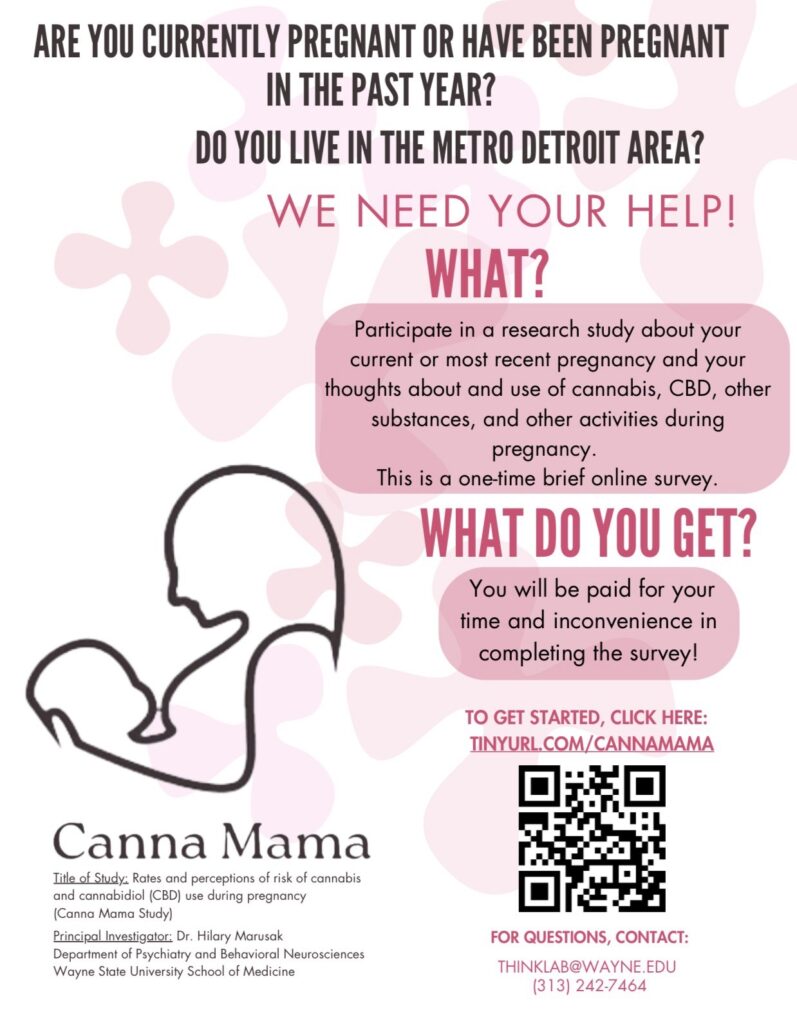TMDN Staff

Two Wayne State University researchers are studying how cannabis use during pregnancy may affect mothers and their babies.
Dr. Hilary Marusak, a developmental neuroscientist and associate professor in Wayne State’s Department of Psychiatry and Behavioral Neurosciences, and Biyyiah A. Strickland, a public health nurse and Ph.D. nursing student, are leading the Canna Mama Study.
The project focuses on how cannabis and cannabidiol use may influence mental health, stress, and biological changes during and after pregnancy.
The Canna Mama Study is open to people in Metro Detroit who are currently pregnant or within one year postpartum, whether or not they use cannabis.
The research has two parts:
• Canna Mama 1.0 – An online survey where participants share their thoughts and experiences with cannabis or other substances during pregnancy.
• Canna Mama 2.0 – An in-person study at the Wayne Health Clinic for Obstetric Care that includes a short mental health questionnaire and a blood draw to measure endocannabinoids, which are natural cannabis-like chemicals the body produces.
Each session takes about an hour, and participants complete a follow-up survey six weeks after giving birth.
Researchers are testing for two main compounds in the blood called anandamide and 2-AG.
Their prior study found that lower levels of 2-AG, which is important for stress and mood regulation, were linked to higher symptoms of depression among pregnant participants. This finding could help identify early biological warning signs for postpartum depression and anxiety in new mothers.
The researchers hope their work will eventually help doctors identify mothers who may need extra support during and after pregnancy.
Dr. Marusak said pregnancy is one of the most sensitive times for brain development and that cannabis exposure during this period can have lasting effects.
“The brain is especially sensitive during pregnancy and the teenage years,” she said. “The cannabinoid system changes rapidly at those stages, and cannabis exposure can affect how the brain develops.”
She pointed to national research, including the Adolescent Brain Cognitive Development (ABCD) Study, which has followed more than 10,000 children since 2015. Those studies found that children exposed to cannabis in the womb often show differences in brain structure and function and may face a higher risk for anxiety, depression, attention problems, and psychotic-like symptoms later in life.
Strickland said some effects can appear shortly after birth. Babies exposed to cannabis during pregnancy may appear more tired or difficult to wake, which can lead to feeding and growth problems. Some infants also struggle to develop proper latching and sucking reflexes, which are needed for nursing.
The research also looks at how cannabis use may affect mothers’ mental health. Early results show that changes in the endocannabinoid system are linked to mood and stress regulation during pregnancy. These findings could help identify biological signs that predict who is more likely to experience postpartum depression or anxiety and lead to better screening and treatment for mothers.
The researchers also warned about secondhand and thirdhand cannabis smoke as a growing health concern.
Cannabis smoking and vaping releases tiny particles known as PM2.5, the same type found in air pollution. These particles can be harmful to adults and even more so to children, whose brains and lungs are still developing.
Cannabis smoke or vapor in enclosed spaces—like cars or homes—can expose others to THC and other chemicals.
Thirdhand smoke refers to the residue that stays on clothing, furniture, and walls. This residue can transfer to infants and young children through contact, even if no one is smoking near them.
Both researchers said their goal is not to criticize or stigmatize anyone who uses cannabis but to make sure families have the facts they need to make informed choices.
“We’re not telling people what to do,” Strickland said. “We want them to have accurate information to protect their health and their baby’s health.”
She added, “Cannabis isn’t all bad or all good. It’s about knowing what you’re putting into your body and having honest conversations with your healthcare provider.”
Because cannabis laws have changed so quickly, they said science is still catching up to understand its full impact.
“There have been times in history when things once thought safe—like tobacco—were later found harmful,” Strickland said. “We should move forward with caution and research.”
The Canna Mama Study is open to Metro Detroit residents who are currently pregnant or within one year postpartum.
Participants can complete a short online survey to share their thoughts about cannabis use and mental health in pregnancy.
Participation is voluntary and confidential.
Those interested can scan the QR code in the flyer below or contact the Wayne State University research team for more information at: www.wsuthinklab.com






